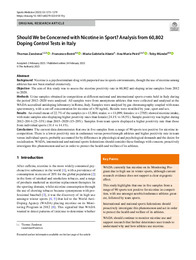Título :
Should We be Concerned with Nicotine in Sport? Analysis from 60,802 Doping Control Tests in Italy |
Autor :
Zandonai, Thomas
Botré, Francesco
Abate, Maria Gabriella
Peiró, Ana 
Mündel, Toby  |
Editor :
Springer Link |
Departamento:
Departamentos de la UMH::Farmacología, Pediatría y Química Orgánica |
Fecha de publicación:
2023-02-24 |
URI :
https://hdl.handle.net/11000/32348 |
Resumen :
Background. Nicotine is a psychostimulant drug with purported use in sports environments, though the use of nicotine among athletes has not been studied extensively.
Objective The aim of this study was to assess the nicotine positivity rate in 60,802 anti-doping urine samples from 2012 to 2020.
Methods. Urine samples obtained in-competition at different national and international sports events held in Italy during the period 2012–2020 were analysed. All samples were from anonymous athletes that were collected and analysed at the WADA-accredited antidoping laboratory in Rome, Italy. Samples were analysed by gas chromatography coupled with mass spectrometry, with a cut-off concentration for nicotine of > 50 ng/mL. Results. were stratified by year, sport and sex.
Results An overall mean of 22.7% of the samples (n = 13,804; males: n = 11,099; females: n = 2705) showed nicotine intake, with male samples also displaying higher positivity rates than female (24.1% vs 18.5%). Sample positivity was higher during 2012–2014 (25–33%) than 2015–2020 (15–20%). Samples from team sports displayed a higher positivity rate than those from individual sports (31.4 vs 14.1%).
Conclusions. The current data demonstrates that one in five samples from a range of 90 sports test positive for nicotine incompetition. There is a lower positivity rate in endurance versus power/strength athletes and higher positivity rate in team versus individual sports, probably accounted for by differences in physiological and psychological demands and the desire for socialisation. WADA, international and national sports federations should consider these findings with concern, proactively investigate this phenomenon and act in order to protect the health and welfare of its athletes.
|
Palabras clave/Materias:
sleep |
Área de conocimiento :
CDU: Ciencias aplicadas: Medicina: Farmacología. Terapéutica. Toxicología. Radiología |
Tipo de documento :
info:eu-repo/semantics/article |
Derechos de acceso:
info:eu-repo/semantics/openAccess |
DOI :
https://doi.org/10.1007/s40279-023-01819-y |
Publicado en:
Sports Medicine (2023) 53:1273–1279 |
Aparece en las colecciones:
Artículos - Farmacología, Pediatría y Química Orgánica
|

 La licencia se describe como: Atribución-NonComercial-NoDerivada 4.0 Internacional.
La licencia se describe como: Atribución-NonComercial-NoDerivada 4.0 Internacional.
.png)